My awakening to the fragility of human rights began when I visited Israel in 2009.
I was shocked to see a nation crisscrossed by barbed wire and twenty-foot-high watchtower studded concrete walls. I saw family land stolen from underneath them by armed squatters. Fenced roads with racially restricted uses, bombed-out homes, and refugee camps turned slums. I came away changed and vowed, that day, to do something to make some kind of difference.
My next major rights awakening happened as I lived through the 2011 Egyptian revolution. I spent three years in Egypt. The first year and a half under the Mubarak regime. I heard the stories of regular human rights violations. People lived in fear of speaking out about the regime because the secret police regularly kidnapped people off the streets who were too outspoken. In those days all police were feared as agents of the repressive regime. The consequence was that eventually, the Egyptian people rose up to demand the tyrant step down. In the absence of respect for their rights by the government, the people of Egypt took those rights for themselves. Unfortunately, the Egyptian revolution was coopted by an entrenched military leadership posing as saviors to the people, when they should have been servants.
I was a spectator to history during the January 25th revolution. I watched from the sidelines as the people of Egypt grappled with the powers that be to transform their society and demand respect from their political institutions. It was amazing to watch my close Egyptian friends struggle for justice. I stood in solidarity with them, but this was not a situation I had any say over, not being Egyptian and having only been in the country a year and a half. The experience made me realize one key thing, the place I was allowed to make a difference was the US, my home, and the place I had a say, politically.
Burdened by my experiences overseas, I returned to the US to pursue academic education, to subsidies the eight years of experiential education I had already gained abroad. I began by pursuing various communicative mediums, video production, graphic arts, and web design. I thought that, while I might not be able to run for office, I could communicate on the important issues around me and further the dialogue around finding solutions. I quickly realized, however, that to speak about the issues, I needed to understand them and decided to switch to Political Science International Relations, given my experience overseas.
Shortly after I transferred to UC Davis, Stephon Clark was killed in his grandmother’s backyard and everything changed. I marched in the streets with the hundreds of others demanding change and accountability. I was stunned when, rather than be receptive to, and engaged with the community, law enforcement arrested protesters en masse, calling the march an unlawful assembly.
What I saw that day on March 4th, 2019 on the i-80 overpass in East Sacramento was an army of police in full riot gear corralling more than 80 peaceful protestors, a clear violation of First Amendment and human rights. I was even more stunned when, rather than repercussions for the killing of an unarmed man in his grandmother’s backyard, the DA chose to undermine the victim’s character in order to justify the killing, while the AG provided no accountability.
I vowed again that day to do something to make a difference and decided to devote my life to the service of Human and Civil Rights.
At UC Davis, I took as many constitutional law classes as I could, and devoted my academic studies to the exploration and understanding of rights, especially in relation to law enforcement. I examined existing data using Python and R to study the relationships minority communities had with their local law enforcement nationwide. I did research on criminal justice, “criminality”, surveillance, and privacy. I looked at existing law enforcement accountability paradigms around the country and performed critical analyses of successes and failures. I even had the opportunity to learn about our own local institutions in the city of Sacramento through first-hand interviews with key law enforcement accountability officials while gathering qualitative data.
I studied rights expansion and contraction throughout American history, by developing a theoretical formwork that examined this process over time. The framework looked at major rights expanding or contracting events like suffrage, emancipation, Jim Crow, separate but “equal”, the Civil Rights movement, and restrictive voter laws.
In short order, George Floyd was murdered by police in Minipalaces and I marched in the streets again, and then Briahna Taylor, and Tamir Rice… and I realized that the list of names just kept growing. I watched as America grew weary of rights talk. Lulled into complacency by half measures and an overwhelming tidal roar of a modern news cycle. While the issue may have left the public eye, it has not left my heart and remains on the forefront of my mind every day and my commitment to the work remains as strong as ever.
One of the many conclusions I have come to during the past few years of observation and study was that the expansion and contractions of fundamental rights is a sign of their innate fragility. Rights in practice do not exist in and of themselves but must be made real, every day by conscious choice. While we may call them inalienable in principle, in practice they must be defended and executed every day in order to remain actual.
Like the people of Egypt, we must stop relying on the assumption of our inherent rights and enact our own protection of those rights by standing up to power and demanding accountability and transparency. We must come together as a people to defend what is our fundamental, individual, inalienable, and inherent value, and the inherent rights that flow from that value. We must remind authority of its service to the public and demand accountability and transparency in order to check power.


Leave a Reply